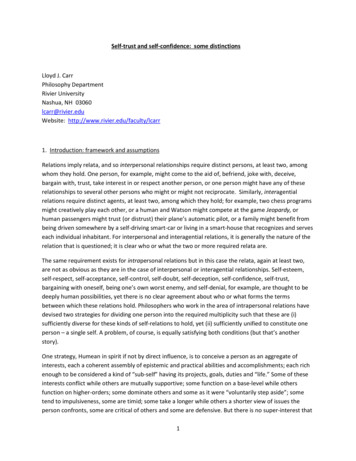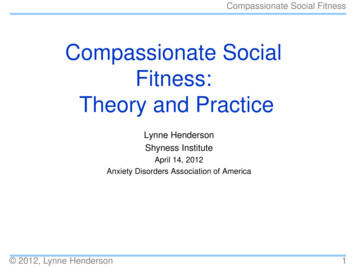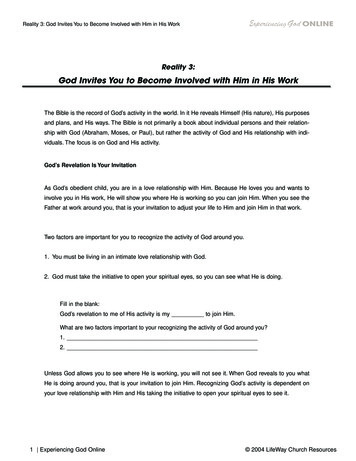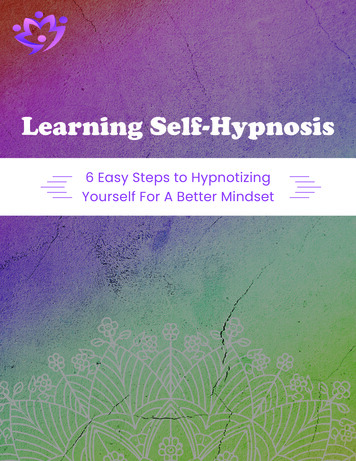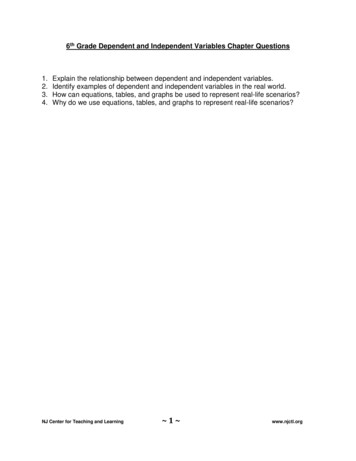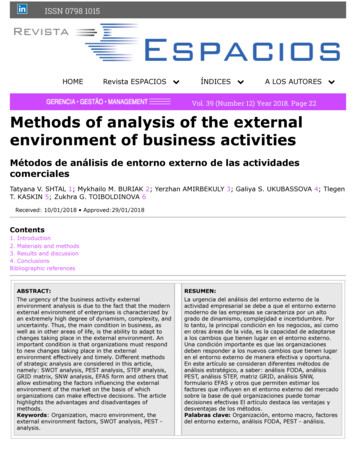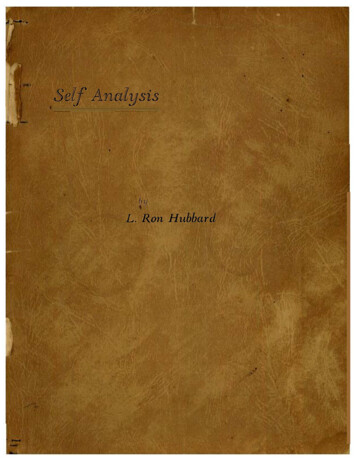
Transcription
Self Analysis ,.'L. Ron Hubbard
byL. Ron l-lubbardThe simplicity of this volume and its system of self analysis and selfhelp permit anyone who can read and understand English to accomplish .the following:1. To know whatever it may be that inhibits his success and his general happiness.2. To increase his efficiency and zest for living as much as fifty percent.3. To rid himself of the effects of psycho-somatic illness su,th assinusitis, migraines, arthritis and the various aches and inswhich comprise.seventy per cent of man's ills.4. To administer therapy to himself without assistance from an'Jone.5. To understand and alleviate' whatever concerns and anxieties hemay have.fhis book and its self-help system used a half hour a day-on th busto-work-during the lunch hour-at home-for just one week may ,markedly improve your health and happiness.This volume contains teste by 'which. you can clearly establish your·quality and capabilities and by which you can estimate the· gains you aremaking by using the self-help section.It contains dozens of lists of questions which you answer and whichsimply, by being answered, may increase your physical stamina and ability beyond anything before possible.The self-help section may halve your reaction time, banish allergies andpsycho-somatic ills and give . back to you an excellent memory and socialpoise.L. Ron Hubbard's discoveries of the basic source of humaff aberrationand ills make such startling results possible. In this volume these discoveries can be applied with no furthE r knowledge than how to read. Thevolume, however, contains as part of its text, the explanation and axiomswhich are behind the tests and the self-help section.If you like simplicity and want a chance to live better and be better, tohave better things, to be ,better liked, this book may be the gold at rainbow's end.
-by-L. Ron HubbardA Simple Self-Help Volume of Testsand Processes Based on the DiscoveriesContained in Dianetics.Published byThe International Library of Arts and Science
Copyrighted August, 1951,byL. Ron HubbardAll rights domestic and foreign reserved.No parts of this book may be reproducedexcept by special arrangement with thecopyright owner except for excerpts usedby reviewers.FIRST EDITIONManufactured in the United Stai.es ofAmerica, 1951.-2-
To those hundreds of thousands of ardent Dianetics supporters who have carried theguidon of sanity against thecrumbling citadels of Superstition and who have succeeded in rallying to their standard the hopes of Man.-3-
Do not harken too well to he who would tellyou this system will not work. He would notfeel safe if people around him grew toostrong. The wise man tests before he talks.The critic but follows the fad of a cynical andapathetic age. You have a right to your ownopinion. This system works or it doesn't according to your experience. Not all the authorities in Christendom can alter natural law.-4-
Publisher's SynopsisThe simplicity of this volume is matched only by itseffectiveness.It is not necessary either to read or understand thetext. The reader may turn at once to Page 36 andfollow the simple directions there and begin immediately upon self processing.Or the reader may turn first to Page 28 and takethe first test and by it learn accurately his potentialsand future and so be able to measure, by taking thesetests from time to time his improvement under the processing section.Or he may begin at the beginning and find out suchinteresting things as the basic goal of life, the rolelanguage plays in existence, and the basics of humanbehaviour as well as the mechanisms of the humanmind.This volume includes an explanation of the principles involved, a set of examinations which the readeradministers to himself, a tone scale which delineatesthe classes of human personality into which all humanbeings fall, and the self-processing section.Simply by answering the questions contained in thevarious processing sections, the concerns and worriesof the individual's life resolve automatically.A card is provided for the reader's use which he rotates from question to question and which tells himwhat sense perception to give attention to in the memories revoked.Self Analysis is simple and easy. Only a vast andcomplete understanding of the human mind such asthat possessed by L. Ron Hubbard could evolve such asystem. For although the reader may never be awareof it, an enormous amount of technical knowledge andexperience underlies Dianetic Self Analysis.In using Self Analysis the reader will experiencethings he had not thought possible. For anything asfundamental as this system, capable of producing theresults it produces, could not be otherwise than powerful.A system such as Self Analysis has never beforebeen possible for the basic laws of human thought andbehavior were not known until L. Ron Hubbard applied his brilliance and his training in the field of atomic and molecular phenomena to the field of humanthought.His discoveries and the results he has achieved withthem have rocked the savants and old schools ofthought to their roots, leaving Dianetics the only validated method of increasing sanity and happinessknown to man.It is not necessary for you to take anyone's statement for it. Apply Self Analysis for a short time andfeel the results for yourself. If you are truly skepticalhave yourself,tested thoroughly by doctors and psychometrists, use the self-processing section for half anhour a day for a month and then cause the tests to berepeated. If you have been faithful to your task, thechange in you should be sufficiently marked to causea considerable stir. Things like this have simply neverhappened before--increased intelligence, faster reaction time, improved physical condition, a happieroutlook on life and much more likely to be liked byyour friends.After their initial antagonism-understandable because Dianetics thoroughly invalidated their beliefsand teachings-leading authorities now admit thatDianetics accomplishes things never before possible inthe humanitites.Self Analysis and its organization is, in itself a triumph, for it gives the benefits of Dianetics to everyone. The scholarly and very intelligent reader can pursue the explanations and axioms contained herein andexplore the whole of Dianetics through more basic-5-
tests on the subject. But the reader who cares littlefor the technicalities and only wants results can bene- .fit by following the simplest directions.There are two warnings, however, that must be given with this book:This volume and its system of Self Analysis is infor the reasonably stable individual. It is notmeant for the severely neurotic or psychotic person andits irresponsible use by such may lead to partial insanity. It is intended for the comparatively normalperson to increase his ability and efficiency, health andlongevity. It can be applied by dianetic auditors to persons of unstable disposition but only by dianetic auditors. As there are now more auditors in America than endedthere are registered psychoanalysts, an auditor can befound for those in severe mental trouble.Self Analysis does not displace professional dianetic co-auditing. The clearing of all engrams and secondaries in a case shoud be done by an auditor. Self Analysis improves tone and opens up a case so that it can befinished with relative ease. For complete dianetic instruction or processing, see your local auditor.For complete information on co-auditing and auditors procure Science of Survival from your local bookstore or write the Hubbard Dianetic Foundation, 211West Douglas, Wichita, Kansas.Meanwhile, Self Analysis will do more for you thanhas ever before been possible.-The Editor.-6-
Author's IntroductionSelf Analysis cannot revive the dead.· Self Analysis will not empty insane asylums or stopwar. These are the tasks of the Dianetic Auditor andthe Group Dianetic Technician.But Self Analysis will conduct you on the most interesting adventure in your Iife. The adventure of you.How efficient are you? What are your potentials?How much can you improve? Well, basically your intentions toward yourself and your fell ow man are good.Basically, if sometimes clouded over with the not sopale cast of bad experience, your potentialities area great deal better than anyone ever permitted you tobelieve.Take your memory, a small part of your total assets.Is it perfect? Can you, at will, recall everything youhave ever learned or heard, every phone number, everyname? If you can't you can see that there is room forimprovement. Now somebody, with a half glance at thetitle page of this book, will try to assume that Self Analysis simply improves memory. That is like sayingthat all a train can do is meet schedules. It does muchmore. But memory is a starter. If your memory wereas accurate as an IBM card index system and even faster, you would be more efficient and more comfortableand it would certainly save writing those notes youhave to make. Yes, you probably couldn't have too gooda memory on things you've studied and things youneed.But there are a lot of things as important as memory. There's your reaction time. Most people reacttoo slowly in emergencies. Let's say it takes you halfa second to pull your hand off a hot stove. That'smany times too long a period to have your hand onthat stove.Or let's say you require a third of a second to seethe car ahead stop and to start to put on your ownbrakes. That's too long. A lot of accidents happen because of slow reaction time.In the case of an athlete, reaction time is a directindex as to how capable he may be in a sport. So itassists one in many ways to be able to react quickly.Self Analysis speeds up reaction time. Here's atrick. Take a dollar bill, unfolded. Have somebodyhold it vertically above your hand. Open your thumband index finger just below the lower edge of thebill. Now let your friend let go. You try to closethumb and index finger on the bill. Did you miss it,snapping after it had gone all the way through? That'svery slow reaction. Did you catch it by its upper edgewhen it was almost gone? That's much too slow. Didyou catch it on Washington's face? That's fair. Ordid you catch it on the lower edge, even before it really got started? That's the way it should be. Less accidents, greater general alertness. Well, barring actual physical damage to hand or arm, Self Analysiswill speed that up for you.Do you have trouble going to sleep or getting up?Do you feel a little tired a lot of the time? Well, thatcan be remedied.As for what they call psycho-somatic illnesses-sinusitis, allergies, some heart trouble, "bizarre" achesand pains, poor eyesight, arthritis, etc., etc., etc., downthrough seventy per cent of man's ills, Self Analysisshould be able to help markedly.Then there's the matter of how young or old youmay look. Self Analysis can make quite a changethere.And there's the matter of plain ordinary ability tobe happy in life and enjoy things. And there Self Analysis shines brightly for it can raise your tone fas*enough, usually, so that even you will agree thi:rigscan be good.As my boyhood hero, Charles Russell, the painter,once described a certain potion, "It'd make a jack rabbit spit in a wolf's eye." Now maybe Self Analysisdoesn't always have this effect, but it happens regularly enough to be usual. Certain it is that the useroften goes through such a period, much to the alarm-7-
ot his friends. Self ·Analysis does have an effect asin the song:"I can lick that guy, I can kiss that girl,"I can ride that bronc and make him whirl . "The moral and caution is "Don't pick too big a·wolf."At least not until you've been using this for a whileand kind of get things in proportion again.In short this is an adventure. How good can youget?A lot depends on how good you are potentially-butyou can be assured that that's a lot better than youever supposed. And it's a cinch it's better than yourfriends would ever tell you.Please don't be discouraged if you find yourself pretty low on the self-evaluation chart later on. All is notlost. The processing section can boost you up at a goodrate if you keep at it.And don't be surprised if you suddenly begin to feeluncomfortable while you're working on the processingsection. You can expect that to happen every now andthen. Just keep going. If it gets too bad, simply turnto the last section and answer those questions a fewtimes and you should start feeling better very soon.All I'm trying to tell you is this-adventures aredull if a little excitement doesn't crop up. And you canexpect excitement-too much in some places.You are going to know a lot about you when youfinally finish.All this is on your own responsibility. Anything aspowerful as these processes can occasionally flare. Ifyou are fairly stable mentally there is no real danger.But I will not mislead you. A man could go mad simplyreading this book. If you see somebody who isn't quiteas stable as he thinks he is working with Self Analysis,coax it away from him. If he can barely stand mentalchicken broth, he has no right to be dining on rawmeat. Send him to see a dianetic auditor. And even ifhe does throw a wheel, a dianetic auditor can straighten him out. Just send for an auditor.Don't, then, disabuse yourself of the fact that SelfAnalysis can send the unstable spinning.We're dealing here with the root stuff of why mengo mad. If it isn't explained in the text, it will be foundin a standard work on Dianetics. Even so, it is doubtful if Self Analysis could create as much madness in ayear as an income tax blank from our thorough if somewhat knuckle-headed government.Now to particulars. You'll filld the tests on Page 28.You can take the first one. It will give you a figurewhich will place you on the chart. Don't blame me ifit's a low score. Blame your parents or the truant officer.Next, it would probably interest you to read the text.It will give you a different viewpoint on things, possibly. It is regretted if it is too simple for the savant ortoo complex or something. It's simply an effort towrite in American a few concepts about the mind basedon a lot of technical material in Dianetics but mademore palatable. You'll do better on the processing ifyou read the text.The processing section has a large number of parts.You can simply work straight through or work overeach one again, and again, until you feel you've sufficiently explored that part of your life. In any case youwill go through every section many times.To help you there is a two-sided disc in the back ofthe book. The directions are on it.Thus you are prepared to go exploring into your ownlife. That's an interesting adventure for anyone. I'vedone what I could to make it easier. Don't be too harshon me, however, if you get grounded up some long lostriver and eaten by cannibals or engrams. The last section will help get you out. What's left of you, anyway.Don't get faint hearted and slack off, though, whenyou find the going rough. It's easy to quit. And thenyou'd never know just what you really are, basically.Going to take the whole trip? You're a brave person.I compliment you.May you never be the same againL. Ron Hubbard-8-
Chapter OneAre you a friend of yours?Probably the most neglected friend you have is you.And yet every man, before he can be a true friend tothe world must first become a friend to himself.In this society, where aberration flourishes in thecrowded cities and marts of business, few are themen who have not been subjected, on every hand, toa campaign to convince them that they are much lessthan they think they are.You would fight anyone who said of your friendswhat is implied about you. It is time you fought forthe best friend you will ever have-yourself.The first move in striking up this friendship is tomake an acquaintance with what you are and what youmight become. "Know thyself !" said the ancientGreek. Until recently it was not possible to make avery wide acquaintance. Little was known about human behavior as a science. But atomic physics, inrevealing new knowledge to man has also revealed thegeneral characteristics of the energy of life and bythat a great deal can' be known which was not beforesuspected. You do not need to know atomic physicsto know yourself, but you need to know something ofthe apparent goal of life in general and your owngoals in particular.In a later chapter there are some questions you cananswer which will give you a better insight into yourcapabilities as they are and what they can becomeand do not be deceived, for they can become a greatdeal more than you ever before suspected.Just now let's talk about the general goal of all life.Knowing that; we can know something about the basiclaws which motivate your own urges and behavior.All problems are basically simple-once you knowthe fundamental answer. And this is no exception inlife. For thousands of years men strove to discoverthe underlying drives of existence. And in an en-lightened age, when exploration of the universes hadalready yielded enough secrets to give us A-bombs, itbecame possible to explore for and find the fundamental law of life. What would you do if you had this fundamental law? How easily then would you understandall the puzzles, riddles and complexities of personalityand behavior. You could understand conjurers and bankpresidents, colonels and coolies, kings, cats and coalheavers. And more important, you could easily predict what they would do in any given circumstance andyou would know what to expect from anyone withoutany guesswork-indeed with a security diabolical in itsaccuracy."In the Beginning was the Word," but what was theWord? What fundamental principle did it outline?What understanding would one have if he knew it?An ancient Persian king once made a great effortto know this Word. He tried to discover it by havinghis sages boil down all the knowledge of the world.At his orders, every book written which could beobtained was collected together in an enormous library.Books were brought to that ancient city by the caravan load. And the wise men of the time worked foryears condensing every piece of knowledge which wasknown into a single volume.But the king wanted a better statement of the fundamental Word. And he made his sages reduce thatvolume to a single page. And he made them reduce itagain to a sentence. And then, after tnany more yearsof study, his philosophers finally obtained that singleWord, the formulae which would solve all riddles.And the city died in war and the Word was lost.But. what was it? Certainly its value, since it wouldmake an understanding of Man possible, exceeded theriches of Persia. Two thousand years later, out of thestudies of atomic and molecular phenomena, we canagain postulate what that Word was. And use it. Useit to know ourselves. And to predict the actions ofother men.-9-
Chapter TwoThe dynamic principle of existence is: SURVIVAL!At first glance that may seem too basic. It mayseem too simple. But when we examine this Word,we find some things about it which make it possiblefor us to do tricks with it. And to know things whichwere never known before.Knowledge could be represented by a pyramid. Atthe top we would have a simple fact but a fact sowidely embracing the universe that many facts couldbe known from it. From this point we could conceivedescending down into greater and greater numbers offacts, represented by the broadening of the pyramid.At any point we examine this pyramid we wouldfind that as one descended he would find facts of widerand less related meanings. As one went up he wouldfind greater and greater simplicities. Science is theprocess of starting low on the pyramid, much like thePersian king, and rising up in an effort to discovermore basic facts which explain later facts. Philosophycould be said to be the operation of taking very basicfacts and then leading them into explanations of greater and greater numbers of facts.At the point of our pyramid, we have SURVIVAL!It is as though, at some remarkably distant time, theSupreme Being gave forth a command to all life:"Survive!" It was not said how to survive nor yet howlong. All that was said was "Survive!" The reverseof Survive is "Succumb." And that is the penalty fornot engaging in survival activities.But what of such things as morals, ideals, love?Don't these things go above "mere survival"? Unf ortuna tely or fortunately, they do not.When one thinks of survival, one is apt to make theerror of thinking in terms of "barest necessity." Thatis not survival. For it has no margin for loss.The engineer when he constructs a bridge, usessomething called a "factor of safety." If a bridge isto hold ten tons, he builds it to hold fifty tons. Hemakes that bridge five times as strong. Then he hasa margin for deterioration of materials, overloading,sudden and unforeseen stress of elements, and anyaccident which may occur.In life, the only real guarantee of survival isabundance. A farmer who calculates to need twelvebushels of grain for his food for a year and plantstwelve bushels has cut back his chances of survivalvery markedly. The fact is, he will not survive, unlesssome neighbor has been more prudent. For the grasshoppers will take part of the wheat. And the droughtwill take some. And the hail will take some. And thetax gatherer will take some. And what will he do forseed wheat if he intends to use all he plants for food?No, the farmer who knows he has to eat twelvebushels of wheat in the coming year had better planta hundred. Then the grasshoppers and internalrevenue people can chew away as they will. Thefarmer will still be able to harvest enough for his ownfood-except of course in a Socialism where nobodysurvives, at least for very long!An individual survives or succumbs in ratio to hisability to acquire and hold the wherewithal of survival. The security of a good job, for instance, meanssome guarantee of survival-other threats to existencenot becoming too overpowering. The man who makestwenty thousand a year can afford better clothingagainst the weather, a sounder and better hoine, medi"cal care for himself and his family, good transportation and, what is important, the respect of his fellows.All these things are survival.Of course the man who makes twenty thousand ayear can have such a worrisome job, can excite so muchenvy from his fellows and can be so harrassed that heloses something of his survival potential. But even asubversive will change his political coat if you offerhim twenty thousand a year.Take the man who makes ten dollars a week. Hewears clothes which protect him very poorly. Thushe can easily become ill. He lives in a place which butill defends him from the weather. He is haggard withconcern. For his level of survival is so. low that hehas no margin, no abundance. He cannot bank anything against the day he becomes ill. And he cannotpay a doctor. And he can take no vacations. Evenin a collective state his lot would be such, his regi--10-
mentation so thorough that he could do little to protect his own survival.Youth has a survival abundance over old age. Foryouth still has endurance. And the dreams of youth-good survival stuff, dreams-are not yet broken byfailures. Youth· has, in addition, a long expectancy,and that is important, for survival includes length oftime to live.As for ideals, as for honesty, as for one's love of one'sfellow man, one cannot find good survival for one orfor many where these things are absent. The criminaldoes not survive well. The average criminal spendsthe majority of his adult years caged like some wildbeast and guarded from escape by the guns of goodmarksmen. A man who is known to be honest isawarded survival-good jobs, good friends. And theman who has his ideals, no matter how thoroughlythe minions of the devil may wheedle him to desertthem, survives well only so long as he is true to thoseideals. Have you ever heard about a doctor who, forthe sake of gain, begins to secretly attend criminalsor peddle dope? That doctor does not survive longafter his ideals are laid aside.In short, the most esoteric concepts fall within thisunderstanding of Survival. One survives so long as heis true to himself, his family, his friends, the laws ofthe Universe. When he fails in any respect, his survival is cut down.The end of Survival, however, is no sharp thing.Survival is not a matter of being alive this momentand dead the next. Survival is actually a graduatedscale.-11-
Chapter ThreeWhere does one cease to Survive and begin to Succumb? The point of demarkation is not death as weknow it. It is marked by what one might call the deathof the consciousness of the individual.Man's greatest weapon is his reason. Lacking theteeth, the armor-plate hide, the claws of so many otherlife forms, Man has relied upon his ability to reasonin order to further himself in his survival.The selection of the ability to think as a chief weaponis a fortunate one. It has awarded Man with the kingdom of Earth. Reason is an excellent weapon. Theanimal with his teeth, with his armor-plated hide, withhis long claws, is fixed with weapons he cannot alter.He cannot adjust to a changing environment. And itis terribly important, to survive, to change when theenvironment changes. Every extinct species becameextinct because it could not change to control a newenvironment. Reason remedies this failure to a markedextent. For Man can invent new tools and new weaponsand a whole new environment. Reason permits himto change to fit new situations. Reason keeps him incontrol of new environments.Any animal that simply adjusts itself to match itsenvironment is doomed. Environments change rapidly. Animals which control and change the environment have the best chance of survival.The only way you can organize a collective state isto convince men that they must adjust and adapt themselves, like animals, to a constant environment. Thepeople must be deprived of the right to control, as individuals, their environment. Then they can be regimented and herded into groups. They become owned,not owners. Reason and the right to reason must betaken from them, for the very center of reason is theright to make up one's own mind about one's environment.The elements fight Man and man fights man. Theprimary target of the enemies of Man or a man is hisright and ability to reason. The crude and blundering forces of the elements, storms, cold and night beardown against, challenge and then mayhap crush theReason as well as the body.But just as unconsciousness always precedes death,even by instants, so does the death of Reason precedethe death of the organism. And this action may happenin a long span of time, even half a lifetime, even more.Have you watched the high alertness of a young manbreasting the forces which oppose life? And watchedanother in old age? You will find that what hassuffered has been the ability to Reason. He has gainedhard won experience and on this experience he seeks,from middle age on, to travel. It is a truism that youththinks fast on little experience. And that age thinksslowly on much. The Reason of youth is very farfrom always right, for youth is attempting to reasonwithout adequate data.Suppose we had a man who had retained all hisability to reason and yet had a great deal of experience.Suppose our grey-beards could think with all the enthusiasm and vitality of youth and yet had all theirexperience as well. Age says to youth, "You have noexperience?" Youth says to age, "You have no vision,you will not accept or even examine new ideas !" Obviously an ideal arrangement would be for one to havethe experience of age and the vitality and vision ofyouth.You may have said to yourself, "With all my experience now, what wouldn't I give for some of the enthusiasm I had once." Or perhaps you have excusedit all by saying you have "lost your illusions." Butyou aren't sure that they were illusions. Are brightness in life, quick enthusiasm, a desire and will to live,a belief in destiny, are these things illusions? Or arethey symptoms of the very stuff of which vital life ismade? And isn't their decline a symptom of death?Knowledge does not destroy a will to live. Pain andloss of self-determinism destroy that will. Life can bepainful. The gaining of experience is often painful.The retaining of that experience is essential. Butisn't it still experience if it doesn't yet have the pain.Suppose you could wipe out of your life all the pain,physical and otherwise, which you have accumulated.Would it be so terrible to have to part with a brokenheart or a psycho-somatic illness, with fears andanxieties and dreads?-12-
Suppose a man had a chance again, with all he knows,to look life and the Universe in the eye again and sayit could be whipped. Do you recall a day, when youwere younger, and you woke to find bright dew sparkling on the grass, the leaves, to find the golden sunbright upon a happy world? Do you recall how beautiful and fine it once was? The first sweet kiss? Thewarmth of true friendship? The intimacy of a moonlight ride? What made it become otherwise than abrilliant world?The consciousness of the world around one is not anabsolute thing. One can be more conscious of color andbrightness and joy at one time of life more than an other. One can more easily feel the brilliant realityof things in youth than he can in age. And isn't thissomething like a decline of consciousness, of awareness?What is it that makes one less aware of the brillianceof the world around him. Has the world changed?No, for each new generation sees the glamour and theglory, the vitality of life-the same life that age maysee as dull at best. The individual changes. And whatmakes him change? Is it a decay of his glands andsinews? Hardly, for all the work that has been doneon glands and sinews---the structure of the body-hasrestored little if any of the brilliance of living.Ah, youth, sighs the adult, if I but .had your zestagain! What reduced that zest?As one's consciousness of the bril
L. Ron Hubbard's discoveries of the basic source of humaff aberration and ills make such startling results possible. In this volume these dis coveries can be applied with no furthE r knowledge than how to read. The volume, however, contains as part of its text, the explanation and axi
